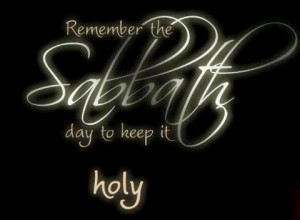 Our church recently worked through a series of teachings on Sabbath. Far beyond a weekly holiday, this biblical concept is loaded with meaning, with each additional layer creating a rich tapestry of teaching that displays the love and goodness of God in fresh ways.
Our church recently worked through a series of teachings on Sabbath. Far beyond a weekly holiday, this biblical concept is loaded with meaning, with each additional layer creating a rich tapestry of teaching that displays the love and goodness of God in fresh ways.
This series of blog posts will aim to capture some of the highlights of discovery along the way.
–
 Digging into the Old Testament concept of Sabbath provides a unexpected shock. The Fourth Commandment seems clear enough: “Observe the Sabbath by keeping it holy.” But Scripture is surprisingly silent about the specifics: How does one keep a day holy? The biblical text spells out harsh penalties for Sabbath-breakers. Additionally, stories of conflict between Jesus and religious leaders of his day indicate a strict evolution of Sabbath views between Sinai and New Testament times. Without doubt, this command was taken seriously. Yet when one considers the extensive detail which the Torah provides regarding issues like priestly garments, dietary rules, sexual conduct, dealing with mold, or managing skin conditions, the law is shockingly vague in regard to Sabbath.
Digging into the Old Testament concept of Sabbath provides a unexpected shock. The Fourth Commandment seems clear enough: “Observe the Sabbath by keeping it holy.” But Scripture is surprisingly silent about the specifics: How does one keep a day holy? The biblical text spells out harsh penalties for Sabbath-breakers. Additionally, stories of conflict between Jesus and religious leaders of his day indicate a strict evolution of Sabbath views between Sinai and New Testament times. Without doubt, this command was taken seriously. Yet when one considers the extensive detail which the Torah provides regarding issues like priestly garments, dietary rules, sexual conduct, dealing with mold, or managing skin conditions, the law is shockingly vague in regard to Sabbath.
Let me highlight a bizarre example to make the point. When is the last time you read Deuteronomy 25:11-12? If this passage has arisen in a recent sermon or small group discussion, then you are part of one fascinating church!
For the rest of us, let’s refresh:
11 “If two Israelite men get into a fight and the wife of one tries to rescue her husband by grabbing the testicles of the other man, 12 you must cut off her hand. Show her no pity.
Okay then.
On the heels of that attention-grabbing legislation, let’s pose an honest question: How often would a nation need detailed direction on how to deal with this particular situation?
Let’s estimate. Envision a nation of 1,000,000 people (many scholars picture ancient Israel with a population around that). How many such squeal-inducing quarrels might unfold among such a group over the course of one calendar year? I don’t know the answer, but lucky for any judges, there was crystal-clear instruction on how to handle this awkward situation.
Now consider Sabbath. Sabbath was expected to be observed by every person in the nation 52 times per year. That totals 52,000,000 instances when “Observe the Sabbath, and keep it holy” is highly relevant. And yet we are not told explicitly how to do it.
What is going on here?
One clue might be found in the word “holy”. The term speaks of something set apart, different from the common. Somehow, this holy day is to be uniquely marked, distinctly distinguished from the other six days of the week.
Mark Buchanan tells a story of visiting a sick man. This successful gentleman had his rhythm disrupted by an extended illness. In conversing with his visiting pastor, the afflicted fellow processed aloud:
“I know God is trying to get my attention. I just haven’t figured out yet what He wants my attention for. He must want me to do something.”
Mark tenderly replied:
“Maybe that’s the problem: You think He wants your attention in order for you to do something. Maybe He just wants your attention.”
 Psalm 46:10 urges: “Be still and know that I am God.” Between those words is a suggestion that some forms of knowing cannot be had without being still. It is highly possible – perhaps a given – that there are times when all God wants is your attention.
Psalm 46:10 urges: “Be still and know that I am God.” Between those words is a suggestion that some forms of knowing cannot be had without being still. It is highly possible – perhaps a given – that there are times when all God wants is your attention.
It would seem that Sabbath is one of those times. Perhaps the unique marks of a “holy day” involve levels of stillness and attentiveness neither sought nor entered on other days.
If any of this is close to what it means to keep a day holy, then Sabbath is more of an art than a science. It’s not paint-by-numbers, it’s a clear canvas with a specific assignment. Sabbath-keeping demands creative consideration: What practical moves might a man or woman make toward crafting a day characterized by unusual levels of stillness and attentiveness?
Some possibilities:
SHUT IT OFF: Technology time-outs might be a most tangible mark of Sabbath in this day – what would more blatantly mark the day as different than backing away from buttons and screens? It seems no stretch to imagine that the monitoring of steps or limiting of tasks so common in Jesus’ day might revolve around texts or emails or episodes if Sabbath interpretation was unfolding in the 21st century.
SHOPPING STOPPED: I have heard people say that nothing disrupts a holiday mindset like entering a mall or mega-store. Brainwaves change the moment one enters the parking lot, and most of those waves wouldn’t be labeled “holy”! In a more general sense, shopping is an act of consumption, and consumption is common, and common isn’t holy. On a day when even ancient Israel planned to grab some extra at Manna-Mart ahead of the Sabbath, perhaps the goal of one day to revel in God’s provision without needing more is an inspired move in the Sabbath dance.
SHHHH: How about some quiet? It is amazing what happens to our insides when we feed on beautiful words or listen to moving music, when we record hidden thoughts or rest weary bodies. In my home of small children, I recognize that life cannot be entirely shut off. Some of this stillness needs modifying in different seasons. But it can still be pursued. It’s an art – be creative!
SUNSHINE: It is no accident that humanity’s origins were in a garden. Creation connects with our depths as no desk or couch or counter can. You might be an avid green-thumb, planting and nurturing and harvesting. You may just like walking. Lie in a hammock, pedal a bike, stroll in the rain, retreat to the woods. If your skin feels a breeze, odds are high your spirit will breathe. Get out there!
SHAKE-UP: Some are guided by a simple Sabbath idea – whatever you normally do, don’t do that! Change the routine. Physical workers, take it easy. Desk-folks, move that body. Word-people, lay down the book. Lone labourers, make plans with friends. If “holy” is opposite to “common”, then a measured move to “different” might lead you into a wonderful way of Sabbath.
SLACK OFF: Everyone has a list of oughts, shoulds, and need-to-do’s. But they aren’t for Sabbath. Tuck them away. Forget about them – not forever, but certainly for now.
In considering Sabbath as an art, a wonderful surprise awaits. This staunch and stuffy command turns out to actually be a life-giving word. And limits and legalism get quickly traded in for the fun and freedom generated by “keeping it holy”.
 YOUR TURN: Your input makes this post better!
YOUR TURN: Your input makes this post better!
- What Sabbath practices have you adopted or flirted with?
- What would mark a day as “holy” within your usual flow of life?
[You can subscribe to this blog via RSS or email, in the upper right corner of this page.]
Like this:
Like Loading...







 “Jason, are you burnt out?”
“Jason, are you burnt out?”

